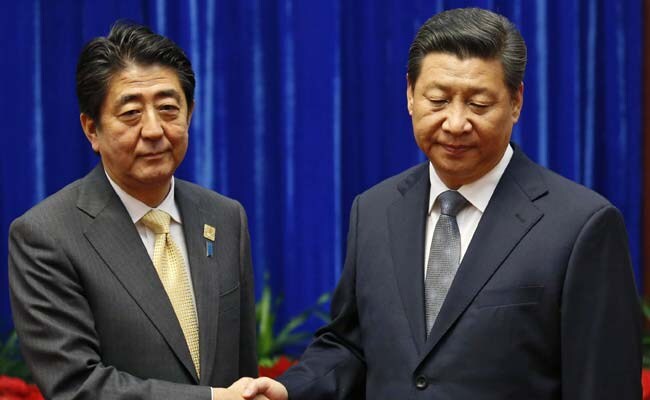
File Photo: China's President Xi Jinping, right, shakes hands with Japan's Prime Minister Shinzo Abe at the APEC Summit. (Reuters)
Nanjing:
China's President Xi Jinping and other Chinese leaders presided Saturday at a ceremony on the 77th anniversary of the Nanking Massacre amid a drive to revive memories of Japan's brutal invasion and stir patriotism.
Addressing soldiers, students, and survivors of the December 1937 killings carried out by occupying Japanese troops, Xi called out Japanese ultra-nationalists who seek to deny the massacre took place.
"Those who uphold justice and love peace must be highly vigilant and firmly oppose those wrong words and deeds," he said. "History will not permit anyone who would deny the facts of the Nanking atrocity."
Estimates of those killed range from 40,000 to the official Chinese figure of 300,000. About 20,000 women were also believed to have been raped over the six weeks of chaos, mass looting and arson.
After the national anthem, participants at the ceremony and people throughout the city stood for one minute of silence against the wail of what was described as the world's largest air raid siren.
China raised the profile of commemorations this year as part of three new holidays to mark major wartime events at a time of a downturn in China-Japan relations, which have been roiled by a series of events leading to a more than two-year suspension in high-level contacts that still haven't been fully restored.
Ahead of the commemoration, a previously unseen archive of wartime materials was released in order to "learn from history," said Yang Haisheng, Director of Shanghai Audio-Visual Archives.
China and Japan have been sparring over a string of uninhabited East China Sea islands that are controlled by Tokyo but also claimed by Beijing.
China also was angered by Japanese Prime Minister Shinzo Abe's moves to permit the dispatch of Japanese troops for operations abroad and visits by Japanese officials - including Abe - to Tokyo's Yasukuni Shrine that honors convicted Japanese war criminals among the country's war dead. They include three of the top commanders executed for their role in the Nanking massacre.
Underscoring the bitterness is a long-standing sentiment among Chinese that Japan has never shown true contrition for its invasion and occupation of China.
Addressing soldiers, students, and survivors of the December 1937 killings carried out by occupying Japanese troops, Xi called out Japanese ultra-nationalists who seek to deny the massacre took place.
"Those who uphold justice and love peace must be highly vigilant and firmly oppose those wrong words and deeds," he said. "History will not permit anyone who would deny the facts of the Nanking atrocity."
Estimates of those killed range from 40,000 to the official Chinese figure of 300,000. About 20,000 women were also believed to have been raped over the six weeks of chaos, mass looting and arson.
After the national anthem, participants at the ceremony and people throughout the city stood for one minute of silence against the wail of what was described as the world's largest air raid siren.
China raised the profile of commemorations this year as part of three new holidays to mark major wartime events at a time of a downturn in China-Japan relations, which have been roiled by a series of events leading to a more than two-year suspension in high-level contacts that still haven't been fully restored.
Ahead of the commemoration, a previously unseen archive of wartime materials was released in order to "learn from history," said Yang Haisheng, Director of Shanghai Audio-Visual Archives.
China and Japan have been sparring over a string of uninhabited East China Sea islands that are controlled by Tokyo but also claimed by Beijing.
China also was angered by Japanese Prime Minister Shinzo Abe's moves to permit the dispatch of Japanese troops for operations abroad and visits by Japanese officials - including Abe - to Tokyo's Yasukuni Shrine that honors convicted Japanese war criminals among the country's war dead. They include three of the top commanders executed for their role in the Nanking massacre.
Underscoring the bitterness is a long-standing sentiment among Chinese that Japan has never shown true contrition for its invasion and occupation of China.
Track Latest News Live on NDTV.com and get news updates from India and around the world

